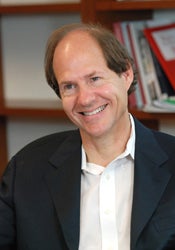Cass Sunstein ’78, Felix Frankfurter Professor of Law and director of HLS’s new Program on Behavioral Economics and Public Policy, has been named a University Professor, Harvard University President Drew Faust announced today.
Harvard’s highest honor for a faculty member, University Professorships were established in 1935 to recognize individuals whose work on the frontiers of knowledge crosses the traditional boundaries of academic disciplines. One of the nation’s most-cited legal scholars, and one of the world’s most prolific, Sunstein is the author of hundreds of publications whose impact has extended beyond law into the social sciences and the public sphere in many nations.
“Cass Sunstein’s scholarly work has cast fresh light on long-standing questions and opened new paths for legal theorists, drawing creatively from fields outside the law to offer insights that consistently enrich not only legal discourse but the wider world of ideas,” Harvard President Drew Faust said in a Harvard Gazette announcement. “He is a scholar, teacher, mentor, colleague, and public servant of uncommon range and distinction.”
Said HLS Dean Martha Minow: “We are thrilled to see Cass Sunstein recognized with the highest academic post, and no one better exemplifies the range of approaches and passion for learning that the university professorship represents. Cass is an extraordinary master of complex disciplines—from constitutional law and theory, to administrative law and policy, from behavioral economics to environmental law, from feminist theory to social media tools. He tackles the tough issues by drawing ever-new connections between law and science, the social sciences and the humanities—in sum, between the approaches to knowledge nurtured across a great University and necessary to address major challenges. We are delighted that he will remain based at the Law School while pursuing ideas and collaborations across the University and beyond.”
Sunstein’s scholarship spans five major areas: behavioral economics and public policy, constitutional law and democratic theory, legal theory and jurisprudence, administrative law, and the regulation of risk. His appointment as the Robert Walmsley University Professor follows the retirement of HLS Emeritus Professor Frank Michelman ’60, who held the chair from 1992 to 2012.
“I feel more honored than I can say,” Sunstein said in the Harvard Gazette. “Harvard has such a remarkable and energizing academic community, with the most extraordinary students and faculty in so many diverse fields. To be here is a privilege; I look forward to doing whatever I can to be worthy of this extraordinary honor.”
Sunstein returned to HLS in 2012 after serving for more than three years in Washington, D.C., as administrator of the White House Office of Information and Regulatory Affairs (OIRA) in the Office of Management and Budget (OMB), a job widely viewed as one of the most important in the current presidential administration. After a two-year leave of absence from Harvard to serve in Washington, D.C., he relinquished his Harvard position in order to stay in government for a third year and beyond.
As the administrator of OIRA, Sunstein oversaw the federal government’s entire regulatory process, and has helped to tackle a broad range of regulatory issues, including an overhaul of the financial services industry, healthcare reform, initiatives to reduce deaths and accidents on the highways, and multiple efforts to protect safety, health, and the environment. He has overseen the ambitious government-wide “lookback” at rules on the books, designed in large part to reduce regulatory burdens. He has also lead a series of efforts to promote public participation in the regulatory process; to ensure consideration of flexible, low-cost approaches; and to require disciplined consideration of the costs and benefits of regulations.
Sunstein is known for his multifaceted expertise in a variety of disciplines, especially in the emerging field of law and behavioral economics, which seeks to shape law and policy around research on how people actually behave in various situations when faced with choices. He has thought extensively about how laws and regulation should incorporate that research in response to some of the biggest hazards of the 21st century.
The author or co-author of more than 25 books and hundreds of scholarly articles, Sunstein is one of the most cited law professors on any law faculty in the United States. He has written extensively on many aspects of public law, including the regulation of risk, the nature of rights, judicial decision-making, and numerous features of administrative, environmental, and constitutional doctrine.
His recent works include “Nudge: Improving Decisions About Health, Wealth, and Happiness” (2d ed. 2009, with Richard Thaler), “Going to Extremes: How Like Minds Unite and Divide” (2009 ), and “On Rumors: How Falsehoods Spread, Why We Believe Them, What Can Be Done” (2010).
Sunstein first joined the HLS faculty in 2008 as the Felix Frankfurter Professor of Law and as founding director of the HLS Program on Risk Regulation. Prior to joining the HLS faculty, he had served as the Karl N. Llewellyn Distinguished Service Professor of Jurisprudence, a joint appointment of the law school and political science department at the University of Chicago.
In 2007, Sunstein was awarded the prestigious Henry M. Phillips Prize by the American Philosophical Society, which is given every three years for lifetime achievement in jurisprudence. He has frequently provided expert testimony to congressional committees, including the Senate Judiciary Committee during its consideration of Supreme Court nominees. Sunstein was elected to the American Academy of Arts & Sciences in 1992 and the American Law Institute in 1990.
He has appeared on numerous television and radio programs and on the pages of many newspapers and magazines, including The New York Times, The Washington Post, The Wall Street Journal, USA Today, The Los Angeles Times, The Boston Globe, The Chicago Tribune, Harper’s, The New Republic and The American Prospect.
Following his graduation from Harvard College and Harvard Law School, Sunstein went on to clerk for Justice Benjamin Kaplan of the Massachusetts Supreme Judicial Court and then for Justice Thurgood Marshall of the U.S. Supreme Court. He also worked in the U.S. Department of Justice as an attorney-advisor in the influential Office of Legal Counsel.
